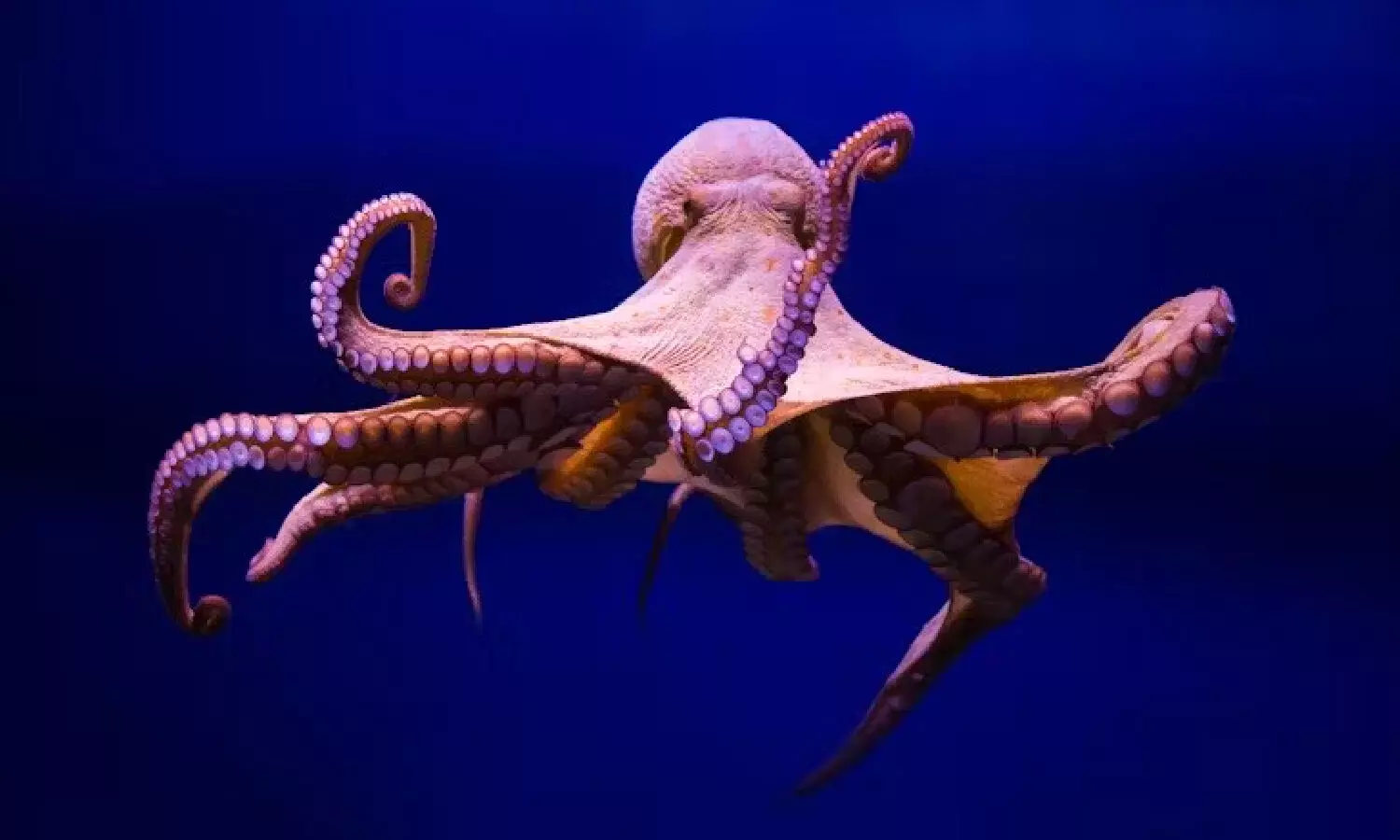On World Octopus Day, scientists highlight how octopus intelligence is shaping robotics, AI research
Experiments have shown that octopuses can unscrew jars, open containers and navigate mazes, often displaying behaviours that suggest memory and planning.
By - Newsmeter Network |
Hyderabad: On World Octopus Day, attention turns not just to the creature’s physical oddities but to its remarkable cognitive abilities.
Octopuses, long admired for their flexibility and camouflage, are increasingly studied for their problem-solving skills, memory, and adaptability. Scientists argue that understanding octopus intelligence can offer insights into robotics, artificial intelligence and even human cognition.
Distributed Intelligence: A brain in every arm
Unlike humans, octopuses do not rely on a single central brain.
About two-thirds of an octopus’s neurons are in its arms, giving each limb a level of autonomous control. This distributed nervous system allows an octopus to manipulate objects, explore its environment, and perform complex tasks without direct guidance from the central brain.
Dr Hitanshi Mehta, a marine neurobiologist, speaking to NewsMeter, explains, “Each arm of an octopus can sense, process and act independently. This decentralised intelligence challenges our understanding of cognition, which is traditionally brain-centric.”
Experiments have shown that octopuses can unscrew jars, open containers and navigate mazes, often displaying behaviours that suggest memory and planning. “They can remember past experiences to avoid dangers or retrieve food, demonstrating both short-term and long-term memory,” adds Dr Mehta.
Problem-solving and tool use
Octopuses are among the few invertebrates known to use tools.
In laboratory settings, they have been observed assembling coconut shells as mobile shelters and manipulating objects to access food. In the wild, species such as the veined octopus (Amphioctopus marginatus) have been documented collecting discarded shells and arranging them for protection.
Dr Vikas Kumar, a marine ecologist studying octopus behaviour in the Indian Ocean, says, “Tool use in octopuses indicates foresight. They are not reacting purely on instinct; they anticipate future needs. This is rare among non-vertebrates and points to advanced problem-solving capabilities.”
Adaptability and camouflage
Octopuses have evolved highly sophisticated camouflage mechanisms, allowing them to change skin colour, texture and pattern within seconds. This adaptability is not purely defensive; it also supports hunting strategies, social signalling and environmental exploration.
According to Dr Mehta, “Camouflage in octopuses is a cognitive process. They assess their surroundings, decide on the pattern and colour, and execute it with precision. It involves complex sensory integration and motor coordination.”
This ability to adapt to changing environments has implications beyond biology. Engineers and designers are studying octopus skin and neural control to develop adaptive materials and soft robotics that respond dynamically to their surroundings.
Implications for robotics and Artificial Intelligence
Octopus intelligence is inspiring innovations in soft robotics, where flexible, adaptable machines can perform tasks in confined or complex spaces.
By mimicking the octopus’s distributed control system, researchers aim to create robots capable of autonomous problem-solving in unpredictable environments.
Dr Shantanu Rangan, a robotics engineer at the Indian Institute of Technology Hyderabad, explains, “Traditional robots rely on centralised control. The octopus model suggests a decentralised approach, where each module can act independently yet in coordination. This has applications in medical robotics, underwater exploration, and disaster response.”
Similarly, Artificial Intelligence research is taking cues from octopus learning. Their ability to process sensory information, adapt strategies and solve problems without rigid programming provides a model for machine learning algorithms that require flexibility and autonomy.
Lessons for human cognition
Beyond technology, studying octopuses can offer insights into human learning and creativity. Their distributed intelligence challenges linear thinking, encouraging a perspective where complex systems rely on autonomous, interacting parts rather than a single controlling centre.
“Observing octopuses reminds us that intelligence is not one-size-fits-all,” says Dr Kumar. “Problem-solving, adaptation, and memory can manifest in multiple forms. There is value in applying this understanding to education, organisational design, and even personal decision-making.”
Conservation considerations
Octopuses face threats from overfishing, habitat degradation, and climate change. Protecting their habitats ensures the survival of these intelligent creatures and the continued study of their unique cognitive abilities.
Dr Mehta notes, “The more we learn about octopuses, the more we realise how much their intelligence can teach us. Losing these species would mean losing an opportunity to understand alternative forms of cognition and innovation in nature.”
Conclusion
On World Octopus Day, attention often falls on their eight limbs, strange forms, and unusual life cycles.
Yet, the true lesson from octopuses may lie in their intelligence, a decentralised, adaptive, and highly capable mind that challenges our assumptions about cognition. From robotics to AI, human problem-solving to environmental stewardship, the octopus offers models that are as instructive as they are fascinating.